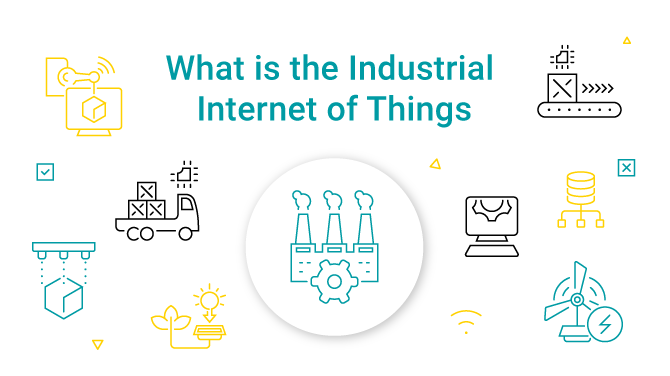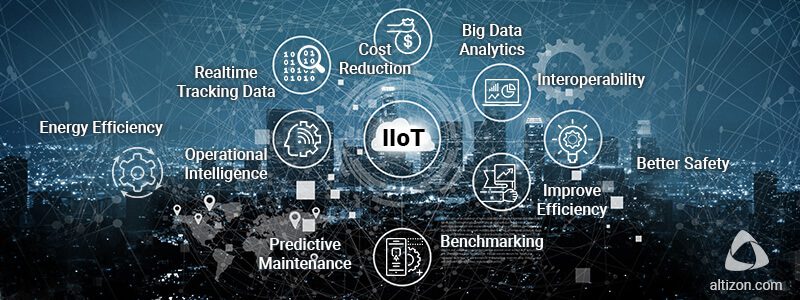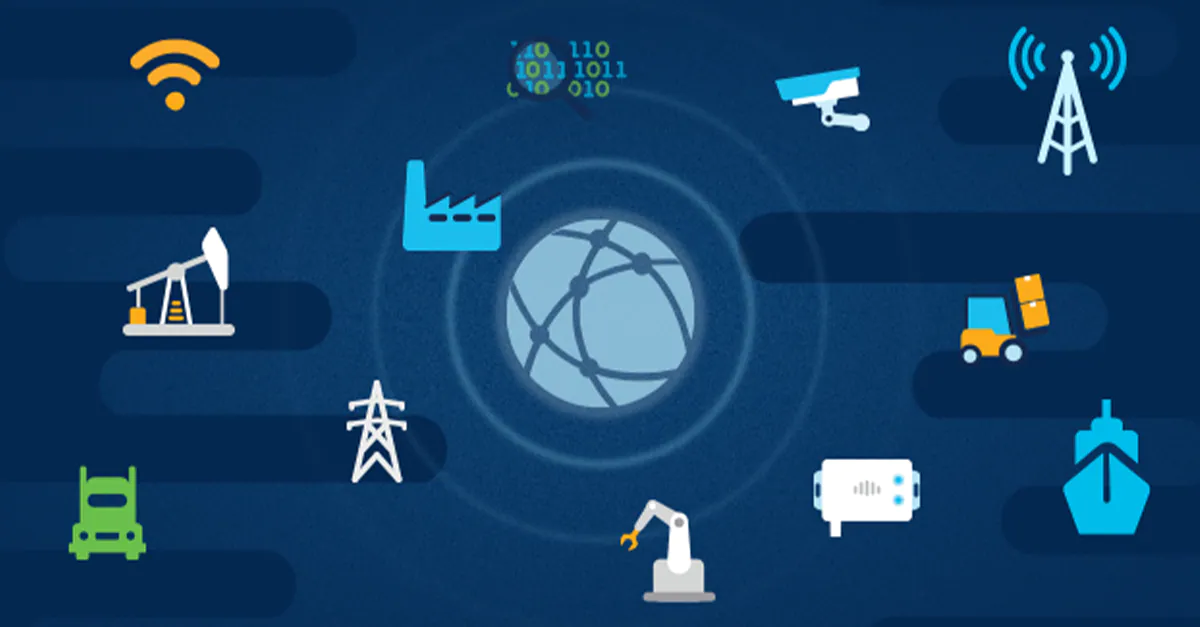Find out What is Industrial IoT solutions


IoT has revolutionized industries, including manufacturing. The IoT market in manufacturing is rapidly growing and is estimated to reach $200.3 billion by 2030. Industrial IoT solutions are the next level of IoT technology, transforming manufacturing operations with various benefits. To stay competitive, manufacturers need to understand and adopt IIoT solutions.
First, we must understand “what is the industrial Internet of Things?”

What is Industrial IoT solutions
The Industrial Internet of Things (IIoT) is all about using the Internet to improve industries. It’s like the Internet of Things (IoT) but for factories and other industrial places. With the IIoT, machines can talk to each other, use big data, and learn from it. This helps industries and businesses be more efficient and dependable. The IIoT is used in various fields like robotics, medical devices, and modern production methods.
IIoT differs from regular IoT because it combines Information Technology (IT) and Operational Technology (OT). It deals with computers and networks, while OT is about controlling machines in industries. The IIoT helps industries become more automated and organized by bringing IT and OT together. It also lets them see their supply chain and logistics better.
In this revolution, things are changing because of technology. With the help of big data and analytics, IoT allows machines to make quick decisions based on real-time information. It makes machines smarter and more capable of doing tasks that were not possible in the past. The IIoT is also essential for creating smart cities and factories.
Industrial IoT solutions help industries in many ways. It lets them collect and share data between machines and devices. This helps them find and fix problems or inefficiencies in their work immediately. It also makes things run smoothly, saves money, and prevents breakdowns.
The Industrial IoT connects different parts of a business. It helps gather lots of data quickly and easily. This allows companies to understand how things are going and make better decisions.
Industrial IoT solutions are a game-changer for industries. It combines technology with industry to make things work better. By using the IIoT, businesses can be smarter, more efficient, and ready for the future. As the IIoT continues to improve, industries can look forward to exciting new possibilities and better ways of doing things.
So, what can manufacturers expect from today’s industrial IoT solutions? Here are 8 significant benefits of adopting a fully connected IIoT manufacturing operation.

Benefits of the industrial IoT software
Increased Efficiency
One of the most significant advantages of IIoT is that it helps manufacturers work smarter and faster. Robots and automated machines can do their jobs more efficiently, making production faster and smoother. Sensors connected to machines monitor how they perform so manufacturers know how to make them work even better.
Shorter Time to Market
With industrial IoT software, manufacturers can get their products to market quicker. Innovative technology lets them make decisions faster when the market changes. They can also see what’s happening in the supply chain and fix any problems faster. This means they can improve how long it takes to make products and get them to customers faster.
Reduced Errors
By using IIoT, manufacturers can reduce mistakes in their work. Technology helps get rid of errors caused by people doing things manually. It also makes it less likely to have cybersecurity issues because of human mistakes. With AI and machine learning, the technology can do complex things independently, keeping data safe and secure.
Predictive Maintenance
IIoT helps manufacturers prevent machines from breaking down. By keeping an eye on how machines are doing all the time, manufacturers can spot problems early. They can then fix them before they become big issues. This saves money and keeps production running smoothly.
Improved Safety
IIoT also makes workplaces safer. It helps with safety on the factory floor and in other areas. If there is an accident, the technology can alert everyone and stop work until the issue is fixed. This keeps everyone safe and helps prevent accidents in the future.
Line Optimization
IIoT not only improves single machines but also helps the whole production process. Manufacturers can look at how all their plants work together and determine the best ways to make things. This helps them use resources better and save money.
Digital Twins
Digital twins are like virtual copies of real machines. With IIoT, manufacturers can use these digital twins to test things and find problems without using real machines. It helps them understand how to make things work better and more efficiently.
Reduced Costs
By using IIoT, manufacturers can save money and make more profits. The technology gives them vital information to make better decisions. This helps them spend less money on unexpected problems. They can also keep an eye on their operations from anywhere, which is very helpful.
More IoT blogs at TECHVIFY:
IoT in healthcare: Exploring Definitions, Impacts and Applications
Internet of things – An uprising and promising technology trend
Here are some important examples of the Industrial Internet of Things (IIoT) that can help you save time and money while ensuring top-quality results:

Applications and solutions of the industrial IoT
The Internet of Things (IoT) helps manufacturers monitor their products from start to finish, including raw materials and production. Even after the purchase, IoT sensors continue collecting data, including customer feedback and any issues with the product. Researchers used IoT sensors and AI to find defects in Printed Circuit Boards (PCBs) with 97% accuracy.
Industrial IoT systems track events in real time throughout the supply chain. Managers can see materials’ locations during shipping and get alerts for unexpected delays. IoT sensors also monitor temperature, humidity, and other conditions of transported goods. Companies like DHL use IoT sensors to ensure the safe transportation of items like COVID-19 vaccines. Combined with AI, IoT optimizes logistics by predicting traffic problems and considering weather conditions for route adjustments.
IoT applications simplify asset tracking in large places like factories and hospitals. Assets like goods and tools can be equipped with unique tags or sensors for easy monitoring. For example, in hospitals, nurses quickly find equipment using IoT tags, saving time and improving efficiency. IoT tags prevent waste in factories by notifying employees about items nearing expiration. Many companies, like Bosch’s Bluehound system, offer IoT tracking solutions, providing detailed asset information. Volvo uses IoT-powered trackers to track vehicles in their truck assembly plants.
Industrial IoT solutions have many exciting applications. It can help decrease downtime and costs caused by equipment failure, automate repetitive and risky tasks for employees and ensure a steady stock supply to prevent delays due to raw material shortages. These are just a few of the benefits it offers.
However, there are challenges when implementing this technology. The main concern with IoT applications in the industry is data security. As more data is collected, processed, and stored, the risk of cyberattacks increases. Another challenge is the costs associated with adopting IoT solutions. When choosing an IIoT vendor, it’s crucial to remember these aspects. We can assist you in adding sensors to your devices, creating a management platform for IoT devices, and developing custom big data analytics solutions that fit your business needs.


Table of ContentsI. What is the industrial Internet of Things?1. The Special Things about IIoT2. IIoT in the Fourth Industrial Revolution3. Empowering Businesses through ConnectivityII. Benefits of the industrial IoT softwareIII. Applications and solutions of the industrial IoTConclusion In the fast-evolving world of online dating, understanding the cost to build a dating app is vital for anyone looking to break into the market. From the initial concept to the final launch, the journey requires careful planning around feature selection, platform compatibility, and user security—each of which plays a critical role in shaping both the app’s functionality and its budget. The…
22 October, 2024

Table of ContentsI. What is the industrial Internet of Things?1. The Special Things about IIoT2. IIoT in the Fourth Industrial Revolution3. Empowering Businesses through ConnectivityII. Benefits of the industrial IoT softwareIII. Applications and solutions of the industrial IoTConclusion You’ve started a business, and now you need a website. But no one on your team knows much about coding, and hiring a full-time web developer just isn’t in the cards right now. Sound familiar? If so, outsourcing your web design might be the perfect solution. Whether you’re a startup building your online presence or an established business looking for a website…
21 October, 2024

Table of ContentsI. What is the industrial Internet of Things?1. The Special Things about IIoT2. IIoT in the Fourth Industrial Revolution3. Empowering Businesses through ConnectivityII. Benefits of the industrial IoT softwareIII. Applications and solutions of the industrial IoTConclusion With much of our communication happening online, it’s no surprise that the dating world has also shifted in the same direction. In 2021, 49 million people in the U.S. alone turned to online dating services—whether to find a serious partner or just enjoy a fun date. The trend became even more pronounced in 2020, as men and women increasingly embraced online dating…
18 October, 2024


Thank you for your interest in TECHVIFY Software.
Speed-up your projects with high skilled software engineers and developers.
By clicking the Submit button, I confirm that I have read and agree to our Privacy Policy